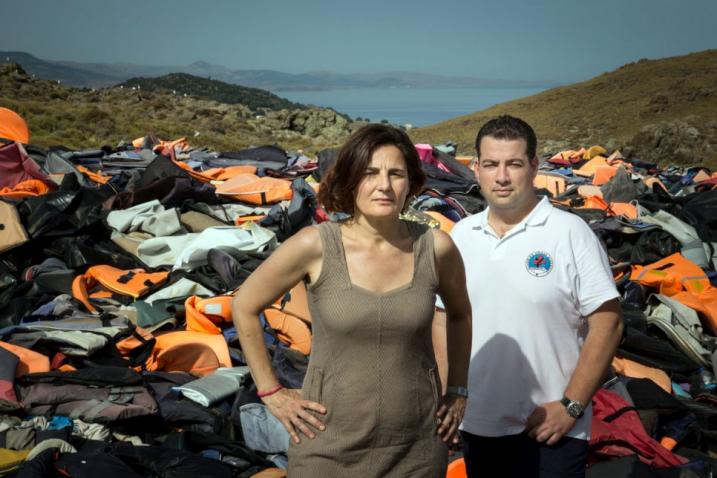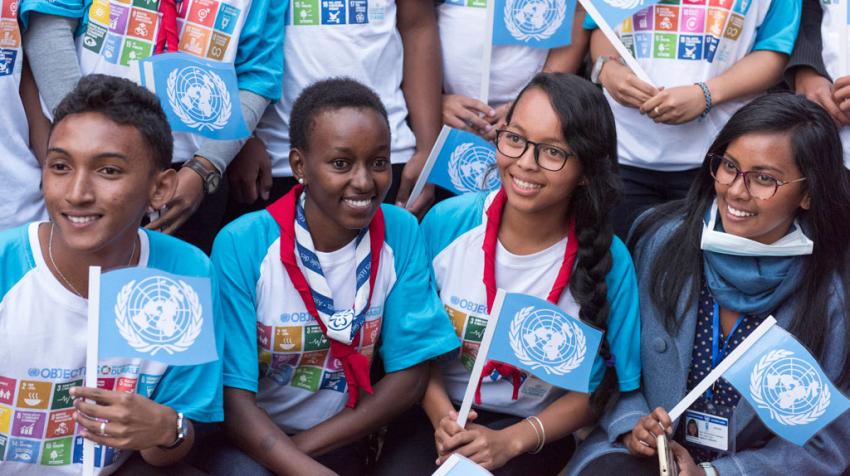
INTERVIEW: Selection of next UN Secretary-General has been game-changing process, says outgoing General Assembly President
8 September 2016 – On 15 June 2015, the United Nations General Assembly elected Mogens Lykketoft – a Danish national – to serve as the President of its seventieth session. At the time of his election, Mr. Lykketoft was the Speaker (President) of the Danish Parliament, a position he had held since 2011. Born on 9 January 1946, it was a fitting coincidence that he would turn 70 during his term as President of the 70th Session of the UN General Assembly– a personal fact he highlighted during his acceptance speech to the world body upon his election.
His tenure as President of the UN General Assembly – which ran from September 2015 – comes to an end this September 2016.

Greek volunteers awarded top UN humanitarian honour for efforts with migrants and refugees
6 September 2016 – A Greek human rights activist and a Greek volunteer rescue team – Efi Latsoudi and the Hellenic Rescue Team (HRT) – have been jointly awarded this year'sNansen Refugee Award for their efforts to aid refugees arriving in Greece during 2015.
Hundreds of thousands of people fleeing conflict and persecution last year made the desperate bid to reach Europe in search of safety, many risking their lives in unseaworthy boats and dinghies, in a journey which all too often proved insurmountable, the UN High Commissioner for Refugees, Filippo Grandi, said in a news release on the win.

On World Day, top UN officials call for prompt entry into force of nuclear test ban treaty
29 August 2016 - Marking the International Day against Nuclear Tests, senior United Nations officials today called for the entry into force of a multilateral treaty that bans all nuclear explosions, for both civilian and military purposes, in all environments. Today marks a quarter of a century since the closure of the Semipalatinsk test site in Kazakhstan, ground zero for more than 450 nuclear tests, Secretary-General Ban Ki-moon in his message for the day. The victims there are joined by others scattered across Central Asia, North Africa, North America and the South Pacific.
A prohibition on all nuclear testing will end this poisonous legacy, Mr. Ban added, noting that it will boost momentum for other disarmament measures by showing that multilateral cooperation is possible, and it will build confidence for other regional security measures, including a Middle East zone free of nuclear weapons and all other weapons of mass destruction.

'We cannot and will not leave anyone behind,' says UN chief on World Humanitarian Day
19 August 2016 – With a record 130 million people worldwide now dependent on humanitarian assistance, Secretary-General Ban Ki-moon stressed that though solutions to the crises that plunged these people into such desperate hardship are neither simple nor quick, there are things we can all do – today, and every day. We can show compassion, we can raise our voices against injustice, and we can work for change.

On International Day, UN says youth can lead global drive for a more sustainable future
The world's young people – who make up the largest generation of youth in history – can lead a global drive to break the patterns of the past and set the world on course to a more sustainable future, United Nations Secretary-General Ban Ki-moon said youth, with their creativity and idealism are the key to delivering the goals of the new UN sustainability agenda.
Young people are directly affected by the tragic contradictions that prevail today: between abject poverty and ostentatious wealth, gnawing hunger and shameful food waste, rich natural resources and polluting industries, said Mr. Ban in his message on International Youth Day, celebrated annually on 12 August.

Many Languages, One World® International Essay Contest Winners Unveil Action Plans for a Sustainable Future at the United Nations General Assembly
Nearly 60 students from around the world gathered at the United Nations General Assembly in New York on 29 July to present their action plans for building a sustainable future through the 2030 Agenda for Sustainable Development. The event was the culmination of the weeklong Many Languages, One World® Global Youth Forum, held at Hofstra University in New York from 25 to 29 July.

On International Day, UN spotlights indigenous peoples' right to education
9 August 2016 – To mark the International Day of the World's Indigenous Peoples, senior United Nations officials are calling on Governments to improve access to education and ensure that the most vulnerable are not left behind as the journey to achieve the new UN Sustainable Development Goals gets under way.
In some countries, less than 40 per cent of indigenous children attend school full-time. In many others, few indigenous children complete a full high school education, UN Secretary-General Ban Ki-moon said in his message on the day.
This is unacceptable, said the UN chief, underscoring that we will not achieve theSustainable Development Goals if we fail to address the educational needs of indigenous peoples.

On Friendship Day, Ban says lives can be enriched, future enhanced through unity and camaraderie
30 July 2016 – Marking the International Day of Friendship, United Nations Secretary-General Ban Ki-moon today urged everyone to unite in a shared spirit of human solidarity to overcome the crises confronting the global society.
Friendship is a joy in itself, conferring happiness and a sense of wellbeing, Mr. Ban said in his message on the Day.
The accumulation of bonds of camaraderie around the world can contribute to fundamental shifts that are urgently needed to achieve lasting stability, he added.

The next International Conference on Theory and Practice of Electronic Governance 2017 will take place in New Delhi, India
The 10th International Conference on Theory and Practice of Electronic Governance (ICEGOV 2017) will take place 7-9 March 2017 in New Delhi, India and will cover a wide range of issues such as digital empowerment, e-Governance, cyber security, and using of big data.
The ICEGOV series focuses on the use of technology to transform relationships between government and citizens, businesses, civil society and other arms of government in order to improve public governance and its contribution to public policy and development. The umbrella theme for ICEGOV 2017 is: 'Building Knowledge Societies &ndash From Digital Government to Digital Empowerment'.

UNESCO explores ways to apply World Heritage Convention to 'wonders' of open ocean
A United Nations-backed report launched today explores the different ways the international treaty governing the inscription of world heritage sites may one day apply to sunken coral islands, floating rainforests, or giant undersea volcanoes, none of which can be considered for listing because they are in the seas outside of any national jurisdiction.

Open Camps Continues to Unite People for Learning Technological Development at United Nations
Open Camps is the world's largest mission-driven open source conference, with 6,000+ attendees joining for 25+ conferences & events, featuring 400+ sessions on dozens of open source technologies. It continues to unite tech developers, NGOs, academic institutions at United Nations Headquarters in New York for learning how to use open source technologies for creating better social environment.

Winners of Multilingual Essay Contest to Meet at United Nations General Assembly in July 2016
United Nations Academic Impact (UNAI) and ELS Educational Services, Inc., are pleased to announce that 60 students have been selected as winners of the 2016 Many Languages, One World® international essay contest. This is the third year ELS Educational Services Inc. and UNAI have partnered to organize Many Languages, One World®.
The winners have been invited to attend the Many Languages, One World Global Youth Forum at Hofstra University in Hempstead, New York. The event includes an all-expense-paid trip to New York City and the opportunity to speak at the General Assembly of the United Nations. Students will present action plans related to the United Nations 2030 Agenda for Sustainable Development.

On Youth Skills Day, Ban urges more investment to assist the 'working poor' and jobless
15 July 2016 – With so many youth either jobless or working poor, more investment is needed to empower them through skills development, United Nations Secretary-General Ban Ki-moon said on World Youth Skills Day today.
There is no better investment than helping a young person to develop their abilities, he said in his message on the Day. Successful skills programmes link young people with opportunities to gain experience and jobs. It is especially critical to cultivate girls and young women with skills in science, technology and innovation.

UN Secretary-General Ban Ki-moon Receives Honorary Doctorate from UNAI Member Paris 1 Pantheon-Sorbonne
On 25 June 2016 UN Secretary-General Ban Ki-moon received an honorary doctorate from the University Paris 1 Pantheon-Sorbonne, a member of the United Nations Academic Impact since 2012.
In his speech, the Secretary-General encouraged students to become active global citizens and make use of the precious gift of exceptional education by find[ing] ways to help those less fortunate and by reach[ing] out to those who are in constant suffering. A significant number of the Sustainable Development Goals address issues concerning youth, and Mr. Ban stressed that the UN is currently working more than ever before with young people and on their behalf.

Stand up for and invest in teenage girls, UN says on World Population Day
11 July 2016 – Leaders and communities must focus on and stand up for the rights of teenage girls, particularly those who are poor, out of school, exploited, or subjected to harmful traditional practices, the United Nations has said, marking World Population Day with a call to bolster the success of the 2030 Agenda for Sustainable Development by investing in better opportunities for teen girls.
